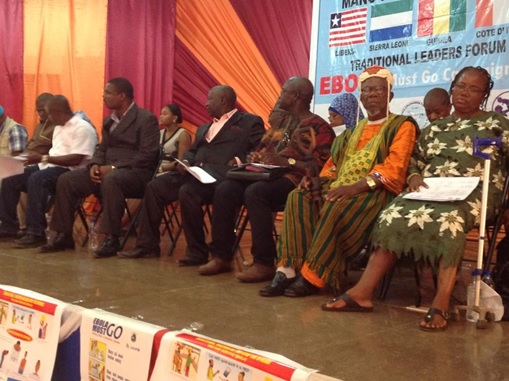Chief Karwor warns against stigmatization

 The Head of chiefs and elders at the National Traditional Council of Liberia, Zanzan Karwor, has warned citizens in the country to stop stigmatizing people, who survived the deadly Ebola Virus Disease.
The Head of chiefs and elders at the National Traditional Council of Liberia, Zanzan Karwor, has warned citizens in the country to stop stigmatizing people, who survived the deadly Ebola Virus Disease.
Chief Karwor explained that stigmatizing Ebola survivors in the various communities would increase the fear of living with others, who are not Ebola victims.
According to him, no one invited Ebola into Liberia, but rather the virus came at a short notice to citizens of the three West African countries, including Liberia, Guinea, and Sierra Leone, causing many innocent people to loss their lives.
He said people should be proud of the government’s effort in containing the virus, which enable many citizens to see their relatives coming from the treatment units alive.
Addressing reporters recently at the Ministry of Information, Cultural Affairs and Tourism on Capitol Hill, Chief Karwor explained that for the fact that thousands of people died from the deadly Ebola virus in the country, family members should also thank God for some of their relatives, who went into the Ebola Treatment Unit or (ETU) and came out alive, instead of rejecting them.
He said rejecting survivors makes them to feel like outcasts, which s not good for the society as their coming back into the home should bring pride and happiness to every family member whose relative contracted the virus.
The chief zoe said it is wrong to stigmatize survivors, who went through tough times of medical treatment, saying, “I thank the best thing to do is to encourage such people, because they have more ideas about the danger of this virus.”
[bsa_pro_ad_space id=1]
He said the acceptance of survivors back in the homes would help in reducing stress, because survivors are there to talk about how they were treated in the ETUs, and what to do when any other relative or next door neighbor encounters the virus.
Meanwhile, chief Zanzan Karwor has blamed health authorities for lack of protection for Ebola survivors, adding that health care workers should have provided special care and treatment to those, who survived the virus before allowing them to get back to their various homes.
By Lewis S. Teh




















